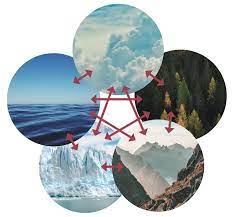
The Impact of Climate Change on Our Planet
Climate change is one of the most pressing issues facing our planet today. The Earth’s climate is changing at an unprecedented rate, largely due to human activities such as burning fossil fuels, deforestation, and industrial processes. These activities release greenhouse gases into the atmosphere, trapping heat and causing global temperatures to rise.
The consequences of climate change are far-reaching and severe. Rising temperatures lead to more frequent and intense heatwaves, droughts, and wildfires. Sea levels are rising as polar ice caps melt, threatening coastal communities around the world. Extreme weather events like hurricanes and typhoons are becoming more frequent and destructive.
In addition to these immediate impacts, climate change also poses long-term risks to ecosystems and biodiversity. Many plant and animal species are struggling to adapt to rapidly changing conditions, leading to loss of habitat and declining populations. Coral reefs are bleaching due to warmer ocean temperatures, putting marine life at risk.
Addressing climate change requires global cooperation and action. Governments, businesses, and individuals all have a role to play in reducing greenhouse gas emissions, transitioning to renewable energy sources, protecting forests, and promoting sustainable practices. By taking steps to mitigate climate change now, we can help safeguard our planet for future generations.
6 Essential Tips for a Greener Planet
- Reduce, reuse, and recycle to minimize waste and conserve resources.
- Choose energy-efficient appliances and lighting to lower electricity consumption.
- Use public transportation, carpool, or bike to reduce emissions from vehicles.
- Conserve water by fixing leaks, taking shorter showers, and using water-saving fixtures.
- Support sustainable agriculture practices by buying local and organic foods.
- Plant trees and create green spaces to help absorb carbon dioxide from the atmosphere.
Reduce, reuse, and recycle to minimize waste and conserve resources.
Reducing, reusing, and recycling are essential practices to minimize waste and conserve resources, especially in the context of combating climate change. By reducing our consumption, reusing items whenever possible, and recycling materials like paper, plastic, and glass, we can significantly decrease the amount of waste that ends up in landfills or incinerators. This not only helps to conserve valuable resources but also reduces the energy and emissions associated with producing new goods. Embracing the principles of reduce, reuse, and recycle is a simple yet powerful way for individuals to contribute to a more sustainable future for our planet.
Choose energy-efficient appliances and lighting to lower electricity consumption.
Choosing energy-efficient appliances and lighting is a simple yet effective way to reduce electricity consumption and combat climate change. Energy-efficient appliances use less energy to perform the same tasks, resulting in lower electricity bills and reduced greenhouse gas emissions. By making the switch to energy-efficient options, we can contribute to a more sustainable future by conserving resources and minimizing our carbon footprint.
Use public transportation, carpool, or bike to reduce emissions from vehicles.
Using public transportation, carpooling, or biking are effective ways to reduce emissions from vehicles and combat climate change. By opting for these sustainable transportation options, individuals can help decrease the amount of greenhouse gases released into the atmosphere, ultimately contributing to a cleaner and healthier environment. Not only does choosing these alternatives reduce carbon emissions, but it also helps alleviate traffic congestion and promotes a more eco-friendly way of getting around. Making the switch to public transportation, carpooling, or biking is a simple yet impactful step that individuals can take to make a positive difference in our fight against climate change.
Conserve water by fixing leaks, taking shorter showers, and using water-saving fixtures.
Conserving water is a crucial step in addressing climate change and promoting sustainability. By fixing leaks, taking shorter showers, and using water-saving fixtures, we can significantly reduce our water consumption and lessen the strain on freshwater resources. Small changes in our daily habits can have a big impact on conserving this precious resource for future generations while also reducing energy consumption associated with water treatment and distribution.
Support sustainable agriculture practices by buying local and organic foods.
Supporting sustainable agriculture practices by buying local and organic foods is a simple yet impactful way to contribute to mitigating climate change. By choosing locally grown produce, you reduce the carbon footprint associated with long-distance transportation of food. Organic farming methods promote soil health and biodiversity, while avoiding the use of synthetic pesticides and fertilizers that contribute to greenhouse gas emissions. By making conscious choices in your food purchases, you not only support environmentally friendly practices but also help build a more sustainable food system for the future.
Plant trees and create green spaces to help absorb carbon dioxide from the atmosphere.
Planting trees and creating green spaces is a simple yet effective way to combat climate change. Trees act as natural carbon sinks, absorbing carbon dioxide from the atmosphere during photosynthesis and storing it in their biomass. By increasing the number of trees and green areas in our communities, we can help reduce the levels of greenhouse gases in the atmosphere, mitigating the impacts of climate change. Additionally, trees provide numerous other benefits, such as improving air quality, providing habitat for wildlife, and enhancing the beauty of our surroundings. By incorporating more greenery into our urban and rural landscapes, we can contribute to a healthier planet for current and future generations.
